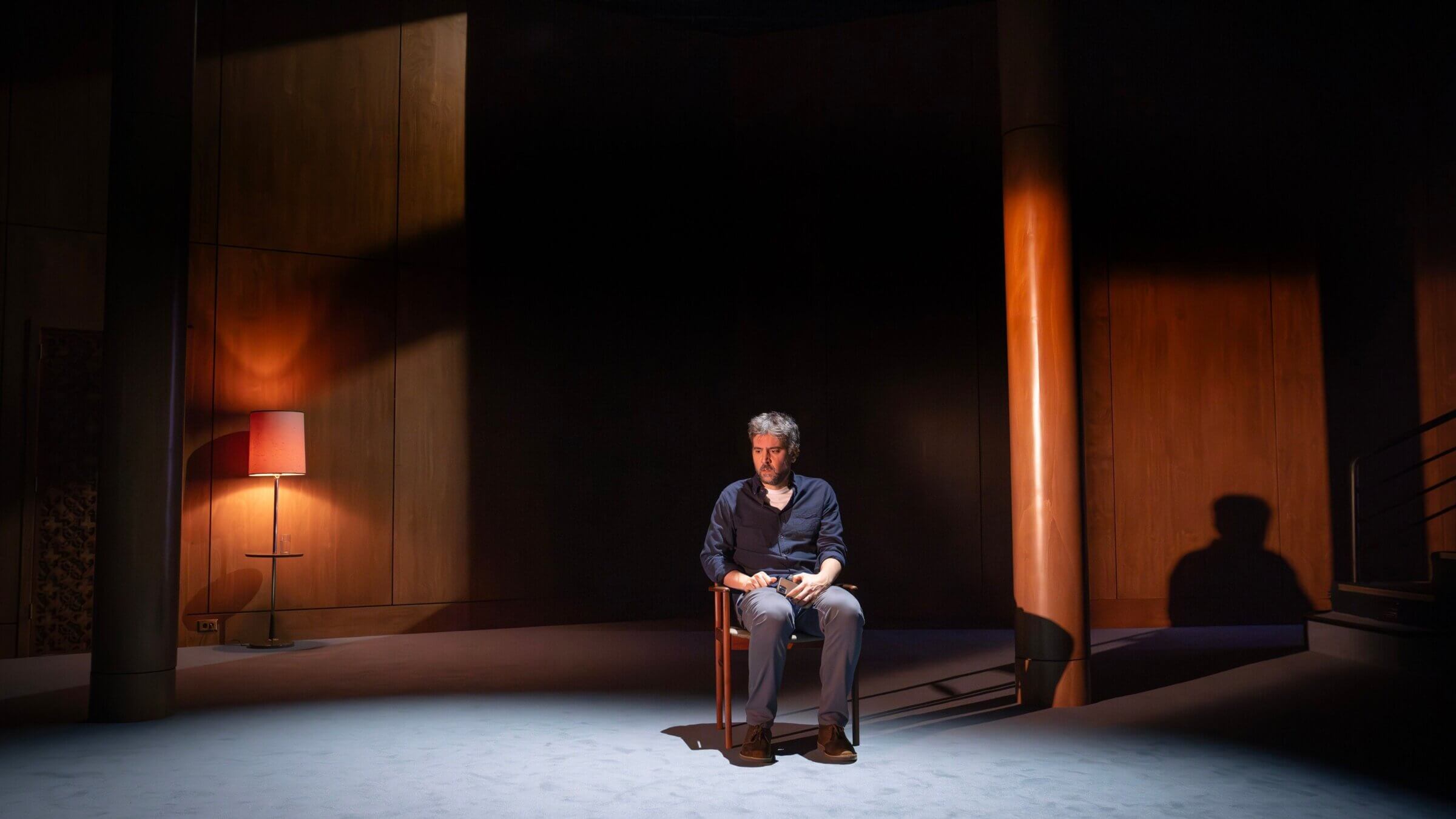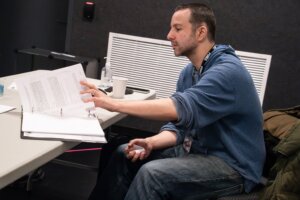How a Jewish playwright’s internal Israel-Palestine debate became a Russian doll of Trojan horses
Itamar Moses says ‘The Ally’ is his most personal work to date

Josh Radnor stars in Itamar Moses’ ‘The Ally.’ Photo by Joan Marcus
Returning from the pandemic-enforced break following his Tony Award-winning musical The Band’s Visit, Itamar Moses has two plays premiering in two months in New York — the offbeat musical Dead Outlaw, opening in March at Minetta Lane and The Ally, currently playing at The Public Theater. The latter is a deadly earnest, vitally urgent and appropriately complex play that centers on a left-leaning Jewish playwright, Asaf Sternheim. He’s an American adjunct professor with Israeli parents who gets caught up in the intersection of the personal and the political in the college town where he moved with his wife. When he spoke with me, Moses described the play — which features characters on five sides of the Palestine-Israel debate — as a “Russian Doll of Trojan horses.” Our conversation has been edited for length and clarity.
Dan Friedman: Tell me about writing the play — you started writing it and then the atrocities of Oct. 7 happened.
Itamar Moses: I started thinking about this as a play because of a few things that happened in 2015-16. Two specific things were, 54 Below canceling a Black Lives Matter fundraiser because of criticism of Israel in a BLM manifesto, and I felt like different parts of me were troubled by that in different ways and then the Open Hillel movement started on college campuses.
It was the realization that those two inciting incidents might belong in the same play that unlocked the way in for me. That was 8 years ago. I started writing it and that was when I was doing readings and sharing it with the public and Oskar [Eustis, artistic director of the Public Theater] getting interested. But then it got delayed for 2 and a half years because of COVID.
Then we set dates and six months after we decided we were doing it, Oct. 7 happened which made the play both a period piece and incredibly topical.

You told The Times that you put it in a drawer for a month. How did you take it out again?
First of all, for weeks after Oct. 7, it was harder to think of a lower stakes question than “What does this all mean for my Off-Broadway play?” At the same time, I had to deal with it. So there was the basic question of “Is there still a place for this?” And if there is, how do I understand what new lens this will cause audiences to bring to it. A lot of the “rewrite” after Oct. 7, was me rereading through the eyes of “now.” It was clear that the play has to take place pre-Oct. 7 because if it took place now it would be a completely different play, so then it was a question of how we experience it now. On a practical level, if someone says something that has been proven definitively wrong, is that intentional irony or foreshadowing on my part or does that seem like a mistake?
It felt like you were rewriting when I came to see it in previews.
Well, we did keep rewriting the final two scenes but then we just cut them. In journalism it’s a truism, “just cut the last paragraph” – and you can do that in movies too – so this was just the playwriting equivalent.
Once we started talking about it seriously, I realized that it was impossible to continue the play plotwise beyond that point, without, in some way, engaging in moralizing, or providing an answer to questions that I in fact, don’t think, have obvious answers, which is why I wrote the play.
And now it’s shorter, under two and a half hours – tell your readers!
You make fun of Asaf for writing plays about England and the 17th Century which is also wry self-derogation. But what’s striking, especially as someone who knows you, is how autobiographical that character is. And even Josh Radnor’s acting — down to the beard and the costume — seems very like you. Why so personal?
This is certainly the most personal piece I’ve ever done, because so many parts of my identity and biography felt relevant, with the right places, themes, and story.
I think that Josh works with the rhythms that are there in the language because there’s been a bunch of actors, different actors, reading the part and people always say, “Wow, he’s doing an impression of you.” And so there’s something in the writing and then from auditions, you cast someone who you know can do it. But, no, Lila [Neugabauer, director] and I never talked about how much to make him like or unlike me.
And I’m going to jump in and push back a little. There’s a novelist Frederick Reiken who teaches fiction writing and he wrote an essay about something he calls the “author, narrator, protagonist merge” which is a problem that he started to identify in his students’ work — especially when it was autobiographical, where they seem to be writing directly from behind the eyes of the character. Paradoxically, this has the result of making it impossible for the reader to see the character, and it’s impossible to identify with them. So with every character, but even — and maybe especially — ones with whom you have a lot in common, you have to sort of hold them at arm’s length enough that you can see them clearly separate from you.
So I think on a surface level, I have a lot in common with Asaf, but he’s at arm’s length. The most obvious difference is that he does all the things that he does in the play whereas I was able to write the play. Which I don’t think he would be able to, at least not maybe until the very end.
The play felt like a good faith distillation of the significant arguments around Israel-Palestine in the past few years and, especially, months. You and I are close to Asaf’s perspective, have you heard from people who take up the other positions? Do you think you got the balance right?
I haven’t yet heard from so many people yet because the play is so new. Friends from different perspectives heard the play in readings and, in the lead up to rehearsals, I vetted it with scholars. If the play is lucky to be more widely known I hope I’ll hear more.
And, though it’s almost a cliche, it is also true that all the characters are like a fragment of the author’s psyche. So, for everyone in the play, I could inhabit their point of view. And so that’s one answer, that they’re all me!
And there’s a more abstract answer: about forces and energy. Theater is a lot closer to music than, say, the novel. And when you’re writing, you can feel the lines of force that you’re harnessing – it’s what creates the tension and the energy and the sustainability of the scene. And you can feel that if you failed to give someone in the scene sufficient ammunition right there that line goes slack.
It’s like the Aristotelian idea of the rock and river. What’s interesting is the unstoppable force meeting an immovable object. But, if there’s a big hole in the rock, or if the river slows to a trickle, there’s something about the energy that goes away. So it’s not as if I have to keep everything perfectly balanced because of an externally imposed principle, it’s more that I want to keep the audience engaged.
I felt that there were a lot of arguments I had heard before, but a few that I was surprised by, or felt new respect for. For example, I had never understood how BLM and Palestine could be linked in good faith and now I do. And, likewise, I felt that the line about the centrality of antisemitism as an excuse for white supremacy was surprising, but sharp, accurate, and not spelled out in social justice spaces. Were there lines or arguments that you felt particularly proud of, or important that you made?
I’ve described the play as a Russian doll made of Trojan horses! There’s a series of points that represent various facets in their complexities that seemed important.
One is when Reuven, at the end of the first act explains that Jews operate as a surface for projection of whatever the anxieties are of a particular culture at a particular time.
Another that comes to the fore in Farid’s big monologue in the second act, is something that I’ve come to understand too, that tribalism is sneakier and less obvious than my side is good your side is bad. We can still see bad things done by people in our tribe and good things by the other, but we are able to dismiss our own tribe’s misdeeds as “a few bad apples” while fundamentally we are good. And likewise the opposite. So it’s why people can see the same picture and see a photonegative – what’s the exception and what’s the rule. That to me was a subtler and more important idea than someone’s a good guy and someone’s a bad guy.
Then the one you flagged, which is the circular paradoxical way that the reason for not including antisemitism as one of the things that the social justice movement is fighting against is that Jews don’t need the protection, which is in fact, when you dig under it, a reason rooted in unexamined antisemitism.
So as a playwriting principle, you start at a comfortable place and then interrogate. I said in my notes that the best way to physically realize a challenging scene is to stage the problem. You know, the thing I can’t write is the thing I must write!
Asaf is there at every moment on stage, alone at the beginning and at the end so by centering Asaf there’s a corollary requirement that he be interrogated for it to have integrity. We have all these rational ideas, but underneath it all, perhaps it’s just about loyalties to all these tribes we belong to.
Despite the intensely personal nature of the play and the passionate topic it covers, you seem less personally worried about the reviews than hopeful that it helps the play.
I think there may be an inversely proportional relationship between how close you get to having done all you could do to make something that feels like it really matters, and how worried you are about the external response. Maybe that’s actually what I’m saying, that I feel like I left it all on the field. Right? Which, you know, is kind of all you can do.






















